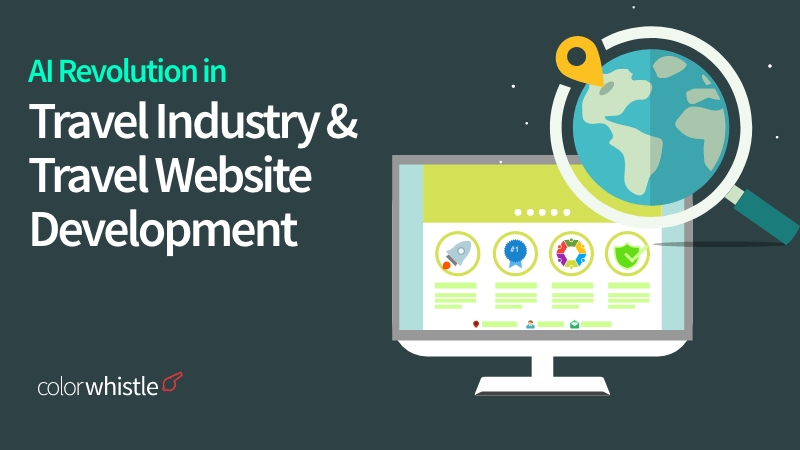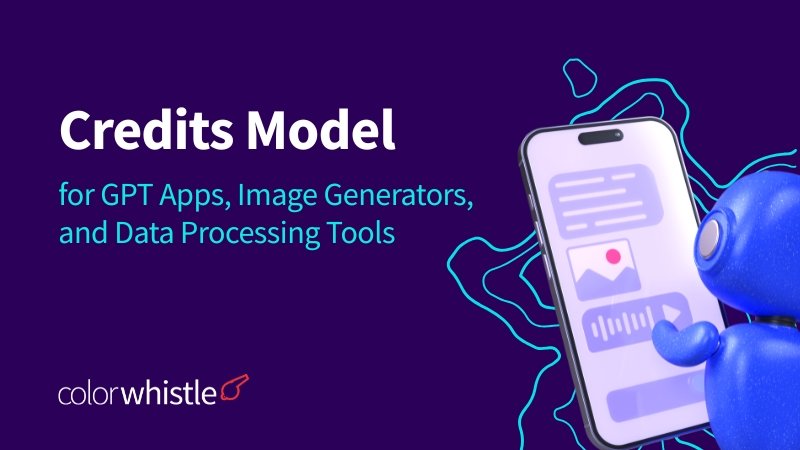AI Summary
Key Highlights of AI Revolutionizing Travel Industry Development
This post explores how AI transforms the travel industry and website development to meet modern travelers' needs. The key insight: AI enables personalized, seamless experiences through chatbots, data analytics, voice assistants, dynamic pricing, and facial recognition. It serves travel businesses and developers aiming to enhance user engagement and operational efficiency. By integrating AI consulting and development services, companies can offer tailored recommendations, optimize pricing, manage disruptions, and strengthen security. Real-world examples include Hilton's AI robot Connie and Airbnb's smart pricing. Readers learn how AI adoption drives competitive advantage, improved customer satisfaction, and streamlined operations in travel services.
The transformative influence of Artificial Intelligence (AI) is evident in the travel industry. As travel enthusiasts increasingly seek personalized and seamless experiences, AI consulting services play a pivotal role. Integrating cutting-edge AI technologies to enhance user engagement, streamline operations, and provide tailored recommendations is essential for a travel business to get the limelight. This is seamlessly possible with the help of a travel website development company. The evolution marks a paradigm shift in travel website development services, as AI-driven innovations redefine how businesses connect with and indulge in the evolving needs of modern travelers.
Also Read
How AI is Revolutionizing the Travel Industry?
The Role of AI is evolving and is getting increased over the recent years, and we could evidently see that it is becoming a widespread option in the travel industry. Below are a few remarkable ways AI technology is deployed in the travel industry.
Chatbots and Virtual Assistance
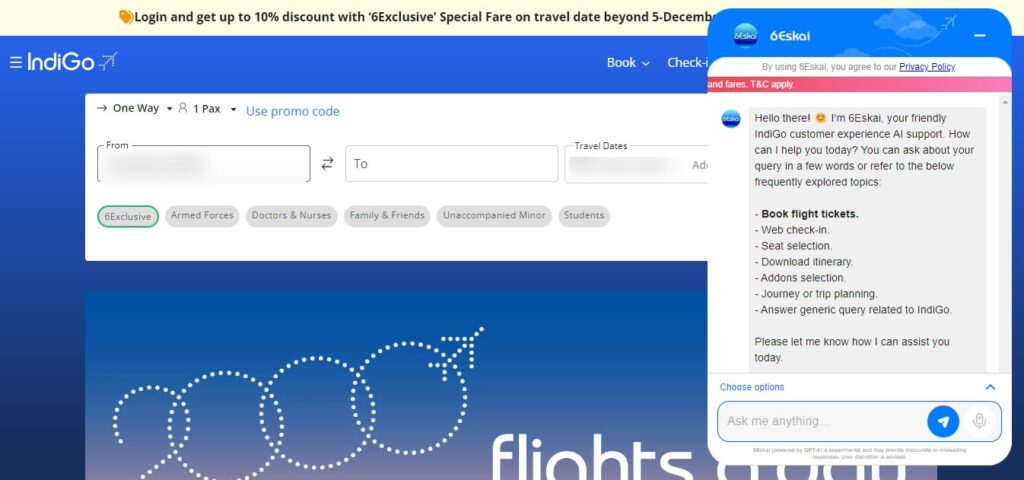
In the tourism industry, especially for hotels and related businesses, the application of artificial intelligence in online customer service is a noteworthy development. A notable application is the integration of AI to empower chatbots on social media platforms and instant messaging apps.
- AI-powered chatbots and virtual assistants provide instant customer support, answer queries, and assist with booking processes.
- These tools enhance user experience by offering real-time assistance, improving customer engagement, and reducing response times.
AI plays a crucial role in addressing queries and furnishing essential information to customers, even during periods when a human customer service representative is unavailable. Given the increasing expectation for swift responses on online platforms, artificial intelligence enables businesses to provide response times that surpass human capabilities.
In-Person Customer Service
While the integration of artificial intelligence for online customer service has become a standard practice, a burgeoning trend involves deploying this technology for face-to-face customer interactions. This innovation proves beneficial in reducing queues at information or reception desks, ultimately enhancing overall operational efficiency.

Powered by artificial intelligence and speech recognition, Connie offers tourist information to customers, engaging in direct conversations with the robot. Each human interaction contributes to refining the robot’s capabilities, thereby elevating the quality of all subsequent communications.
Data Analytics for the Travel Industry
AI revolutionizes data processing and analysis, enabling swift and insightful decision-making. AI algorithms efficiently handle vast datasets, extracting valuable insights on customer preferences, market trends, and operational patterns.

This data-driven approach enhances personalized recommendations, optimizes pricing strategies, and streamlines operational processes. The integration of AI empowers travel businesses to adapt dynamically, offering a more tailored and responsive experience to their customers while achieving greater operational efficiency.
Conversational AI
Voice-based digital assistance is transforming the travel industry by providing seamless and hands-free interactions. Leveraging AI-powered voice recognition, users can effortlessly inquire about travel information, book accommodations, and receive real-time updates.

This technology enhances user convenience, making the travel experience more accessible and personalized. Whether accessing destination details or managing bookings, voice-based digital assistants offer a user-friendly and efficient means of interaction, catering to the evolving preferences of modern travelers.
Personalized Recommendations
AI is reshaping the travel industry through personalized recommendations, tailoring experiences based on individual preferences. Analyzing user behavior and historical data, AI algorithms offer bespoke suggestions for destinations, accommodations, and activities. The result is a more customized and satisfying journey for travelers, with AI contributing to a more efficient and personalized approach to travel planning.
Example: TripAdvisor, employs AI to provide personalized travel recommendations.
By understanding user reviews and preferences, the platform enhances the travel planning process, ensuring users receive tailored suggestions that align with their unique tastes and preferences. This personalized approach contributes to a more engaging and satisfying travel experience.
Dynamic Pricing
Numerous travel and tourism enterprises adopt a dynamic pricing approach, adjusting rates based on demand and availability. This dynamic pricing model is prevalent across hotels, airlines, and various sectors within the industry. AI plays a crucial role in optimizing this strategy, ensuring businesses can efficiently adapt to changing market conditions and enhance overall pricing effectiveness.

AI algorithms analyze variables such as demand fluctuations, historical data, and market trends to dynamically adjust prices for accommodations, flights, and other services. This responsive pricing model not only maximizes revenue for travel businesses but also ensures competitive and flexible offerings to customers. The integration of AI-driven dynamic pricing enhances adaptability and efficiency, contributing to a more agile and competitive position in the market.
Overcoming Travel Disruption
AI plays a pivotal role in managing travel disruption by swiftly analyzing complex data during unforeseen events. From weather-related issues to flight delays, AI systems predict and mitigate disruptions, enhancing operational resilience. Machine learning algorithms process real-time data, enabling proactive decision-making for rerouting, resource allocation, and timely communication with travelers. This proactive approach minimizes the impact of disruptions, ensuring a smoother travel experience and greater customer satisfaction in the face of unexpected challenges.
Have a read about The power of AI during times of airline disruption from Aerogility.
Smart Luggage Handling
Smart luggage handling employs advanced technologies, such as RFID tags and GPS tracking, to enhance the efficiency and security of luggage management in the travel industry. With these innovations, travelers can track their bags in real-time through mobile apps, reducing the risk of loss or misplacement.
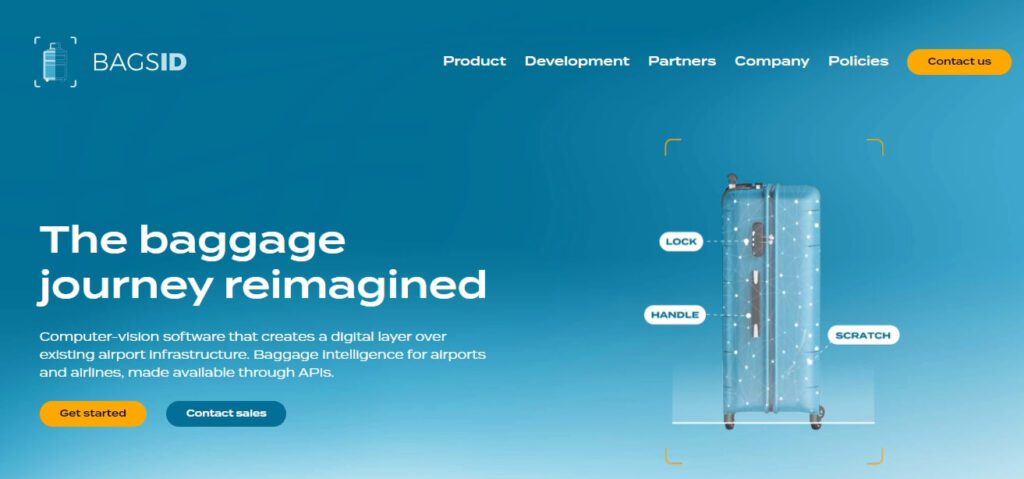
Airlines and travel agencies benefit from streamlined operations, as smart luggage systems automate check-in processes and provide data insights, contributing to an overall improved travel experience for both businesses and passengers.
AI Face Recognition

AI face recognition is a cutting-edge technology that employs artificial intelligence algorithms to identify and verify individuals based on facial features. It analyzes unique facial patterns, such as the distance between eyes or the shape of the nose, to accurately match faces against a database. Widely used for security, access control, and authentication purposes, AI face recognition is reshaping industries, from surveillance to user authentication on devices, offering a sophisticated and efficient means of identity verification.
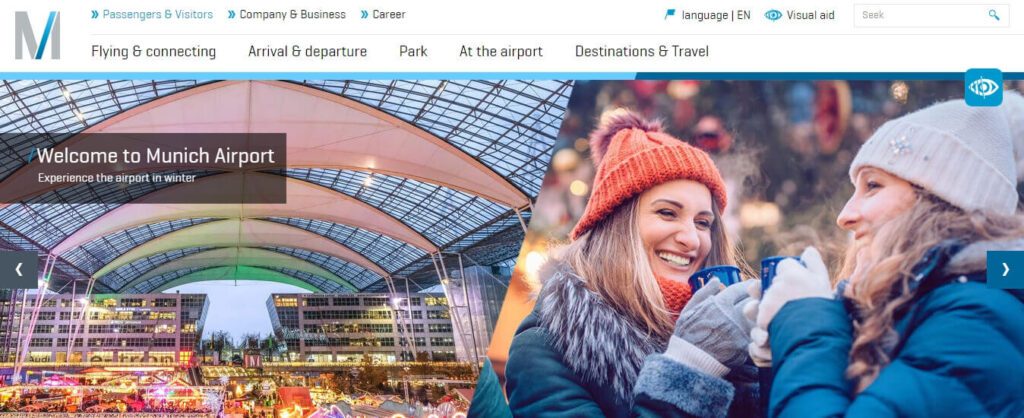
Within airports, it serves to identify individuals of interest. Additionally, this technology can assess the headcount in specific areas, contributing to safety and security measures. The versatility of facial recognition in these contexts underscores its significance in bolstering surveillance and ensuring the well-being of individuals within these environments.
Workforce Optimization Solution
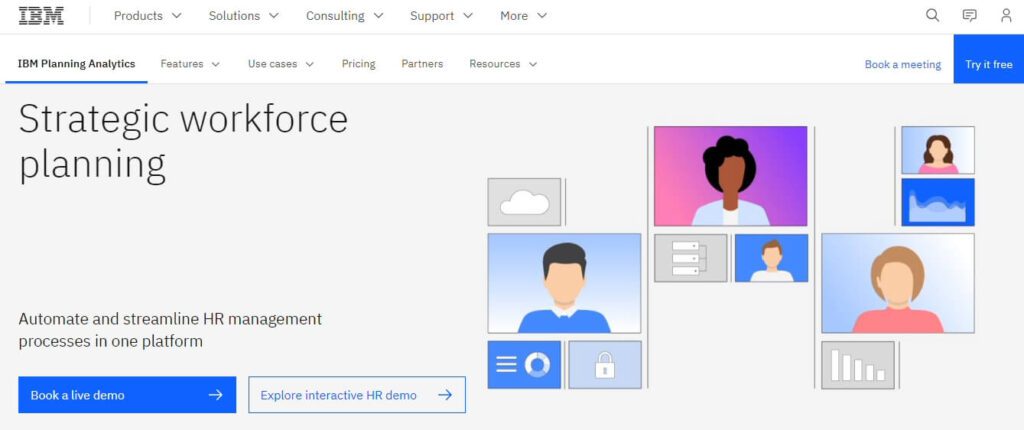
AI-powered employee management schedulers in the travel industry bring efficiency and flexibility to workforce organization. These intelligent systems leverage predictive analytics to optimize staff schedules based on demand fluctuations, minimizing overmanning or deficiency. AI ensures optimal resource allocation, enhancing operational productivity. This technology not only streamlines scheduling processes but also contributes to improved employee satisfaction and overall service quality in the dynamic and ever-changing landscape of the travel sector.
Fraud Detection and Security
AI plays a pivotal role in strengthening the security landscape of the travel industry by bolstering fraud detection mechanisms. Advanced algorithms scrutinize transaction patterns, swiftly identifying anomalies and potential security threats.
This proactive approach ensures secure online transactions, instilling confidence in users. Through continuous learning, AI adapts to evolving fraud tactics, providing a robust defense against cyber threats. The integration of AI in fraud detection strengthens the overall security infrastructure of the travel industry, safeguarding sensitive information and fostering trust among travelers.
Language Translation
AI-driven language translation is a game-changer in the travel industry, breaking down communication barriers for a seamless global experience. Advanced language processing technologies enable real-time translation of text and speech, facilitating effortless communication between travelers and service providers who speak different languages.

This promotes inclusivity, enriching the travel experience by ensuring accurate and effective interactions, ultimately contributing to improved customer satisfaction and a more interconnected global travel landscape.
Virtual Reality (VR) and Augmented Reality (AR)
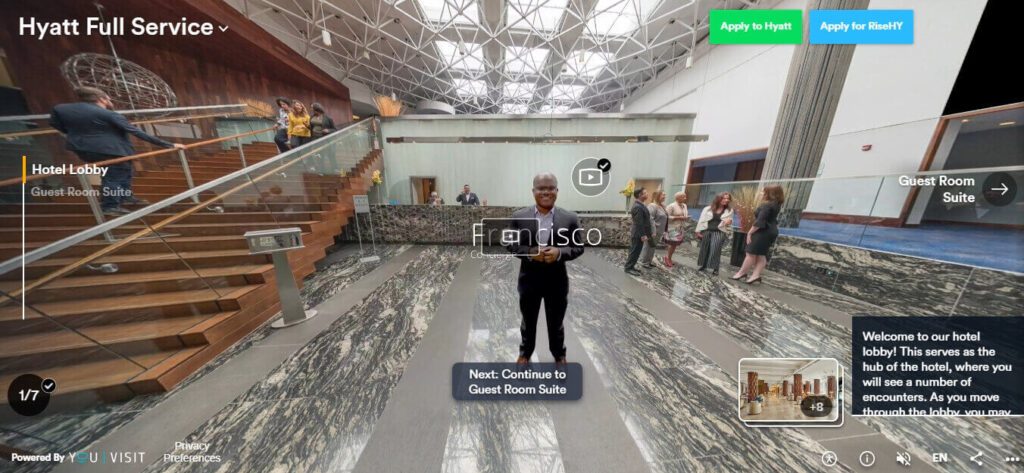
Virtual Reality (VR) and Augmented Reality (AR) are transforming the travel industry, offering immersive experiences for users. VR enables virtual tours of destinations, while AR enhances real-world experiences by overlaying digital information. These technologies enrich travel planning, allowing users to explore accommodations and attractions in unprecedented ways, fostering more informed decision-making.
Aircraft Maintenance
Did You Know?
Rolls-Royce utilizes advanced AI and machine learning to proactively address engine issues in real-time, ensuring efficient maintenance and heightened reliability.
AI optimally manages aircraft fleets, employing predictive maintenance for real-time performance data. This enhances aircraft conditions, extending fleet life expectancy. Improved fleet management reduces cancellations, minimizes disruptions, and shortens turnaround times, increasing revenue. AI automates visual inspections using computer vision to detect defects, streamlining the process.
Also Read
AI and Travel Website Development
In terms of travel website development, incorporating AI features involves integrating machine learning models, natural language processing (NLP), and other AI technologies into the platform. Travel websites should focus on creating a seamless and personalized user experience, leveraging AI to analyze data, predict user behavior, and enhance overall customer satisfaction.
Additionally, staying updated with the latest AI advancements ensures that travel websites can continue to offer innovative features and stay competitive in the industry.
The Role of AI in Shaping Tomorrow’s Journeys
As we gaze ahead, Artificial Intelligence is poised to further shape the travel and tourism landscape, promising heightened personalization, efficiency, and growth. AI’s potential in hyper-personalization is evident, with algorithms evolving to provide even more tailored recommendations, potentially redefining customer expectations. In terms of operational efficiency, AI is set to automate various aspects of the industry, leading to increased levels of efficiency and cost savings.
Additionally, AI’s predictive capabilities will empower businesses to make strategic decisions with confidence, fostering growth and profitability. This glimpse into AI’s future impact foretells an era where it becomes integral to driving innovation and growth in travel and tourism.
If you are looking for professional travel website development services you can contact ColorWhistle by sending us a message or calling us at +1 (919) 234-5140, we’ll get back to you at the earliest. We provide services tailored to your requirements that suit your business. We are also experts at website development services, as well as web designing. You can approach us for any of these services to make a robust online presence for your business.
What’s Next?
Now that you’ve had the chance to explore our blog, it’s time to take the next step and see what opportunities await!

